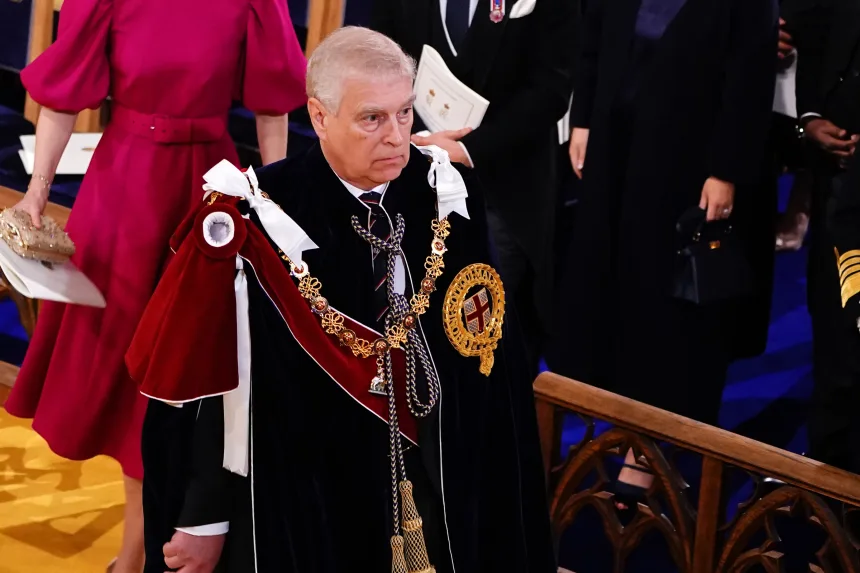King Charles has taken the final step to banish his brother from royal life. Prince Andrew must leave his home of more than 20 years at Royal Lodge, a 30-room mansion near Windsor Castle. The king has also stripped Andrew of his titles and honors. The monarchy needed this decisive action to draw the thickest possible line between Andrew and the rest of the royal family.
This unprecedented move definitely raises questions about the timing of this intervention. A cloud has hung over Prince Andrew since 2010 when his association with convicted sex offender Jeffrey Epstein became public. The search for a long-term solution proved complex, as the royal family’s tradition dictates that titles and honors last for life. Royal observers call this dramatic development “a very clear statement” – a necessary step to restore order and protect the monarchy’s future.
The final decision: What King Charles did and why
Image Source: The Boston Globe
Buckingham Palace made a dramatic announcement about King Charles’s decision to strip his brother of his royal identity. This stands as one of the most important actions taken against a royal family member in modern British history.
Stripping of titles and honors
The King took decisive action to remove Andrew’s princely status and multiple titles and honors. His brother will no longer carry the titles of Prince Andrew, Duke of York, Earl of Inverness, or Baron Killyleagh. On top of that, he loses the honorific “His Royal Highness” and his honors like the Order of the Garter and Knight Grand Cross of the Royal Victorian Order. British royalty hasn’t seen such an extraordinary measure in over 100 years – the last prince lost his title in 1919. From now on, people will know him simply as Andrew Mountbatten Windsor.
Eviction from Royal Lodge
The title loss comes with another blow – Andrew must give up his home. Palace officials have served formal notice for him to surrender the Royal Lodge’s lease, his residence since 2004. The Grade II-listed Windsor estate property has a gardener’s cottage, Chapel Lodge, six-bedroom cottage and security accommodation. Andrew will leave this 30-room mansion for a property on the private Sandringham estate in Norfolk. The move should happen “as soon as practicable”. King Charles will privately fund this new accommodation.
Use of royal warrants to avoid parliamentary debate
King Charles chose to use royal warrants instead of risking an embarrassing parliamentary debate to remove Andrew’s titles. The Lord Chancellor, David Lammy, will receive these warrants to officially revoke the peerages. Parliament could have abolished the dukedom through an act, but Charles wanted to let them focus on urgent national issues. This strategy let the King act quick to avoid public scrutiny. The King made this decision after getting support from the wider royal family, including heir-to-the-throne Prince William, and the government.
The long road to disgrace: How Andrew got here
Image Source: Yahoo
A friendship that started over two decades ago led to Prince Andrew’s dramatic fall from grace. The royal’s relationship with Jeffrey Epstein gradually destroyed his reputation and his standing in the monarchy.
Early ties to Jeffrey Epstein
British socialite Ghislaine Maxwell introduced Andrew to Epstein in 1999, though some sources suggest their acquaintance dates back to the early 1990s. Their connection quickly grew stronger. Epstein and Maxwell became regular guests at royal events and attended a Windsor Castle party that celebrated Andrew’s 40th birthday in June 2000. The three managed to keep a close relationship, and Andrew later admitted he stayed at several of Epstein’s properties.
The 2019 BBC interview fallout
The prince’s disastrous November 2019 BBC Newsnight interview changed everything. Andrew tried to explain his relationship with Epstein but failed to show any empathy for victims and gave unlikely explanations. He claimed he was at Pizza Express in Woking with his daughter and couldn’t have met Virginia Giuffre. He made a strange claim about not being able to sweat due to “an overdose of adrenaline in the Falklands war”. The backlash was swift. He announced his withdrawal from royal duties and acknowledged that Epstein had become a “major disruption” to the royal family.
Virginia Giuffre’s lawsuit and memoir
Giuffre accused Andrew of sexually assaulting her three times at age 17 – in London, New York, and on Epstein’s private island. Her posthumously published memoir described Andrew as “entitled – as if he believed having sex with me was his birthright”. Andrew denied all allegations but settled her civil lawsuit in February 2022. The settlement amount remained undisclosed but estimates suggest around AED 59.85 million.
Leaked emails and timeline inconsistencies
The October 2025 email leak proved devastating for Andrew. He wrote to Epstein on February 28, 2011, saying “we are in this together and will have to rise above it”. This contradicted his BBC interview where he claimed all contact with Epstein ended in December 2010. The email’s timing after the publication of the photograph showing Andrew with his arm around teenage Virginia Giuffre destroyed any remaining credibility he had.
Public and political pressure on the monarchy
Image Source: CTV News
Public outrage and political pressure played significant roles that forced King Charles to act against his brother. The monarchy faced unprecedented pressure while scandals kept surfacing.
Heckling incident and media scrutiny
The whole ordeal reached its peak when someone heckled King Charles during his visit to Lichfield Cathedral. A protester yelled questions about Andrew’s connections to Epstein: “How long have you known about Andrew and Epstein?” and “Have you asked the police to cover up for Andrew?” The confrontation, caught on video, sparked extensive media coverage and amplified demands for decisive action. The loyal supporters told the heckler to “shut up,” but the incident showed the growing public anger clearly.
MPs calling for action
Political pressure built up from all sides of the spectrum. The SNP’s Stephen Flynn introduced a motion to strip Andrew of his dukedom through legislation. Independent MP Rachael Maskell reported that all but one of these York constituents opposed Andrew having their city’s name. Conservative shadow justice secretary Robert Jenrick stated Andrew had “disgraced himself” and “embarrassed the royal family time and again”. The government, however, refused to schedule parliamentary time for debate.
The monarchy’s need to avoid further embarrassment
Historian Andrew Lownie noted that while the palace “finally taking decisive action,” it “won’t completely satisfy the public disquiet”. The royal family knew that doing nothing would risk permanent damage to their reputation.
What this means for the monarchy’s future
Image Source: Salon.com
The monarchy faces a turning point after Charles took unprecedented action against Prince Andrew. His bold decision shows a most important move in the royal family’s approach to scandal and accountability.
A move toward accountability
Charles’s actions break clearly from how royal misconduct was handled before. He stripped Andrew of his titles and residence, showing that royal privilege doesn’t shield anyone from their actions’ consequences. The royal family traditionally avoided public discipline of its members, but that has changed now.
Protecting Prince William’s inheritance
Charles’s decision goes beyond just accountability. Moving Andrew from Royal Lodge helps protect William’s future inheritance since the property is part of the Crown Estate that William will receive. This practical step shows Charles wants to ensure the institution remains stable for years ahead.
Is it too little too late?
People still wonder if this action came too late to fix the damage. Over the last several years, the palace’s slow response to Andrew’s scandals hurt public trust. We must weigh Charles’s firm action now against the long time Andrew stayed protected despite growing evidence of wrongdoing.
Public trust and the monarchy’s image
The monarchy can only survive with public support. Charles showed that protecting the institution’s reputation matters more than family loyalty. Notwithstanding that, rebuilding trust needs more than just symbolic actions—the royal family must stay transparent and accountable at every level.
King Charles has drawn a clear line between his disgraced brother Prince Andrew and the rest of the royal family. His unprecedented measures have effectively banished Andrew from royal life. This bold action marks a critical turning point for the British monarchy, yet questions remain about why this step wasn’t taken earlier.
Prince Andrew now faces the fallout from his Jeffrey Epstein connections after decades of controversy. The removal of his titles, residence, and HRH designation breaks from traditional royal protocols. Charles’s decisive action, unlike previous administrations’ hesitation, showed he would put the institution before family ties.
The decision wasn’t spontaneous but calculated. A combination of leaked emails contradicting Andrew’s claims and mounting political pressure across party lines created circumstances that required royal action. Charles knew protecting his brother would threaten the monarchy’s foundation.
Royal experts consider this a defining moment in Charles’s reign. The King has shown he will make tough choices to preserve the institution. The damage to public trust remains significant because years of perceived inaction led many to question whether royals faced the same consequences as ordinary citizens.
A new chapter begins for the monarchy. Charles has shown unprecedented commitment to accountability in royal circles. Time will reveal if these changes reflect real reform or just damage control. The British public’s traditionally strong support for their royal family will determine if these actions restore their confidence.
Andrew’s story warns about the dangers of privilege without responsibility. His path from decorated naval officer to royal outcast shows how quickly public opinion can shift. Other royals should take note – royal status no longer shields anyone from consequences.
The monarchy needs public support to remain stable. King Charles has taken major steps to address past mistakes, but rebuilding trust needs constant transparency and accountability. This difficult moment for the royal family might help ensure its survival in an age where privilege faces intense scrutiny.






